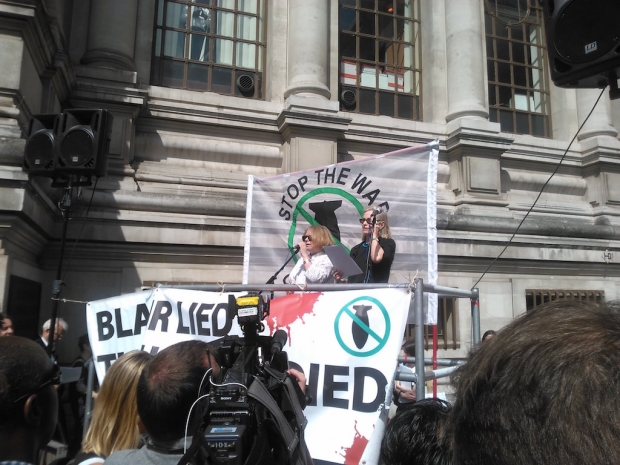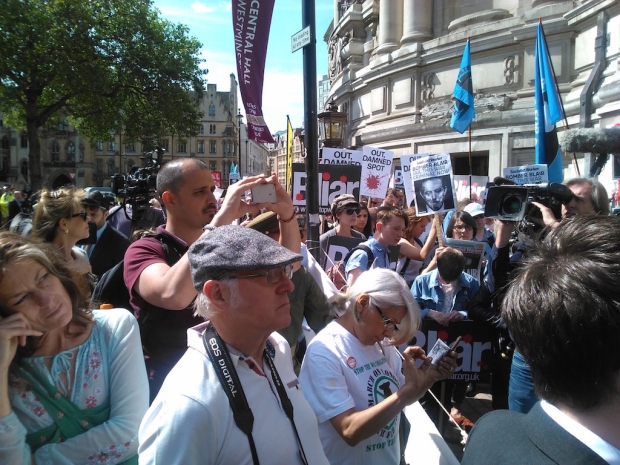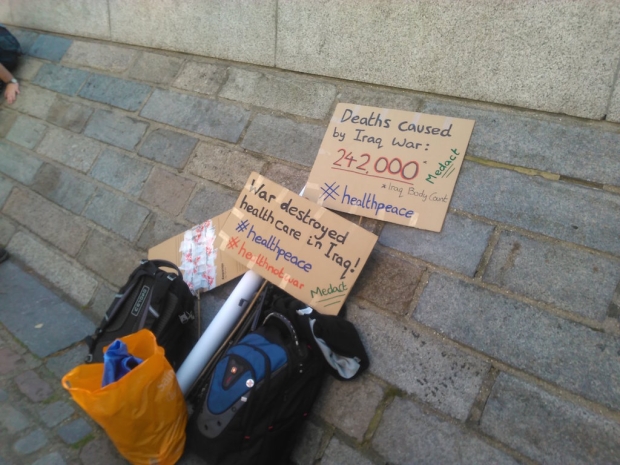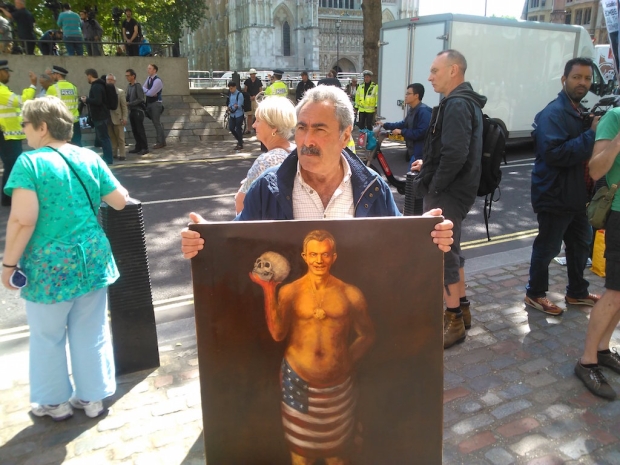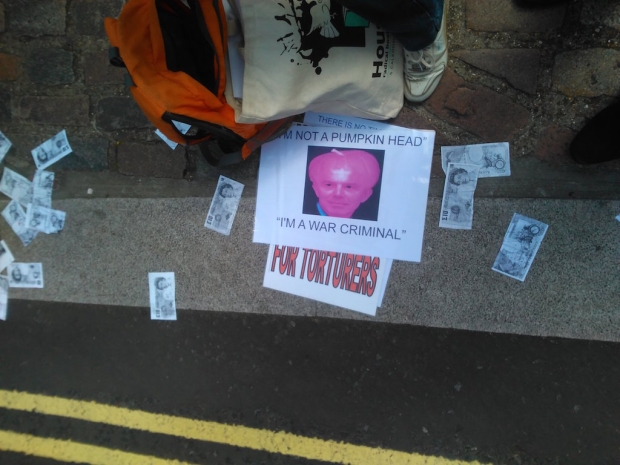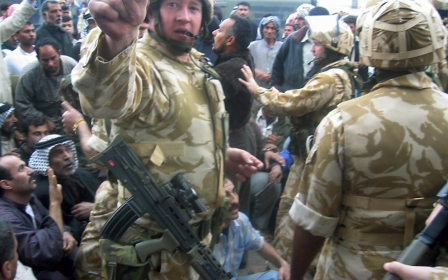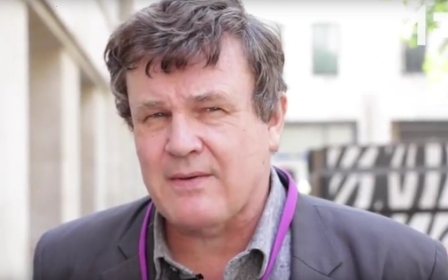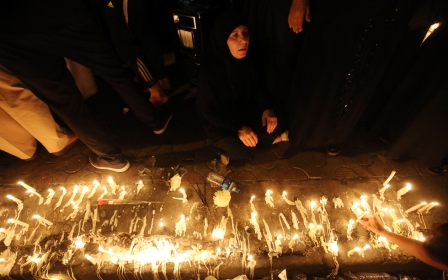Among hardcore Iraq war protesters, 'Bliar' remains ultimate cartoon villain
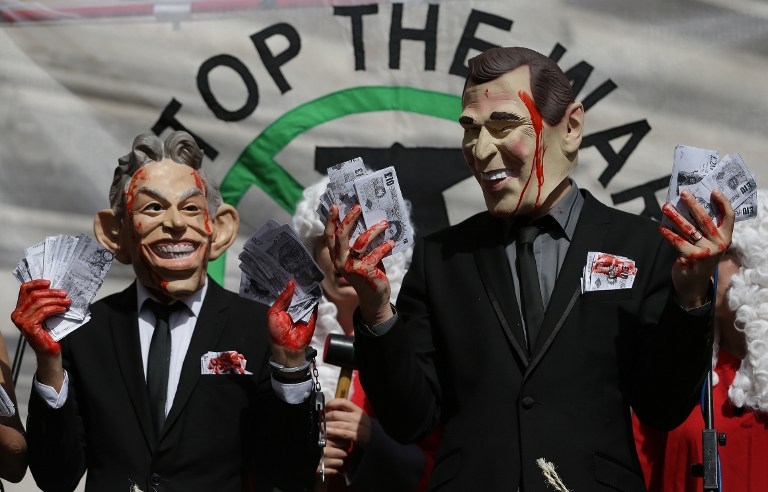
Counter-factual hypotheses have become a staple of former British prime minister Tony Blair's efforts to justify his decision to lead the country into war in Iraq.
So it's perhaps worth wondering what might have happened had it been Gordon Brown or the late John Smith - Blair's successor and predecessor respectively as Labour Party leaders - who had been in charge at the time of the 2003 invasion.
If nothing else, it would have been deeply frustrating for placard designers who have spent years revelling in being able to swap the “a” and “i” in Blair’s name - almost as if it were predestined.
Nevertheless, the former Middle East peace envoy presented himself to the world visibly shaken but still defiant as he claimed the long-awaited publication of the Chilcot report on Wednesday proved he had not acted in “bad faith” and that he was undeserving of the “Bliar” moniker.
“Whether people agree or disagree with my decision to take military action against Saddam Hussein, I took it in good faith and in what I believed to be the best interests of the country,” he said, shortly after the report’s publication.
For those who have spent more than a decade campaigning to see Blair in the stocks for the war, often standing in the street outside buildings where he was speaking, his claims that the Chilcot report absolves him of deception ring hollow.
“I’d say he can’t have read it. Quite simply,” said Chris Nineham, the national officer of the Stop the War coalition, speaking to Middle East Eye shortly after the report’s release.
“It’s impossible to lie in good faith and the report, I think, vindicates that position.”
Stop the War and its allies assembled outside the Queen Elizabeth II Conference Centre in Westminster - a notoriously ugly building for a notoriously ugly subject - early on Wednesday morning, ready to put the boot into their longtime enemy and declare their calls for Blair to be dubbed a "war criminal" finally justified after years of stalling.
“Blair lied, millions died!” went the oft-repeated chant from the crowd, a figure perhaps raising eyebrows in an era of what some have dubbed “post-factual politics".
The death toll from the Iraq war has long been disputed and different political factions have played with figures to suit their particular agendas.
Some in the anti-war movement claim more than a million have died since 2003, presumably including those who died as an indirect result of the war through disease, crime, etc. A 2013 household survey said 460,000 had died amid violence and infrastructure collapse, while some figures have put the toll at less than 200,000.
Nevertheless, many anti-war activists hold Blair responsible not just for the slaughter in Iraq, but the subsequent destabilising of the wider Middle East and the rise of the Islamic State (IS) group that grew in occupied Iraq out of a combination of former members of Saddam’s Baathist Party and foreign fighters who originally enlisted under the leadership of Jordanian al-Qaeda militant Abu Musab al-Zarqawi.
Numbers on the demonstration weren’t huge, partly because of the work-unfriendly hours and awkward location (police were on hand to micro-manage even the crossing of roads between the two sides of the demo). But the weather, being gloriously sunny, was no excuse this time.
"This report vindicates many of the things that we and millions of people in Britain have been arguing for the past 13 years, which is that the war was based on a series of lies by Tony Blair and others, that the strategy and the timetable were dictated by Washington, that it was a war for regime-change that Britain signed up to behind the backs of parliament and behind the backs of the people," Nineham told MEE.
"It was an illegal war and therefore this has big ramifications both for the future of British foreign policy, but also for the question of what happens to Tony Blair now, and there has to be some sort of due process."
Nineham added he was "pleasantly surprised" by the report’s contents.
'Insane, a fanatic, a narcissist'
But there was not an ounce of love on display for someone who in 1997 was hailed as the man who brought the British left back into power after almost two decades in the wilderness.
Jeremy Hardy, a comedian best known for his appearances on BBC radio satirical panel shows, was in no mood to mince words about Blair.
“I think he’s insane, I think he’s a fanatic, I think he’s a narcissist," he told MEE. "I think that he’s a craven supporter of any Atlanticist project that the White House can come up with. I think he’s a disgrace.”
He added that he believed the on-going attempts within the Labour Party to unseat present leader Jeremy Corbyn - one of the staunchest critics of the Iraq war and a former chair of Stop the War - showed that many of those who backed the war in the first place had not learnt their lesson.
“I think that the fact the Labour Party is still in thrall to this madman and are wanting Jeremy Corbyn - who’s entirely vindicated today - to be replaced by somebody more like the maniac who unleashed this, I find extraordinary,” he said.
The legacy of the British in Iraq is long and torturous. An appendix to Chilcot's report traces their influence in the country to the arrival of an English merchant, John Eldred, "who left London in 1583 on a five-year journey that took him to Baghdad".
"The first British military involvement came in 1775, when the Ottoman Turks faced a sustained Persian attack on the Shatt al-Arab waterway. The Turkish Sultan asked Britain to defend the waterway; the British Prime Minister Lord North agreed, and the Royal Navy drove the Persians out of the Sultan’s domains," the report continued.
After the 2003 invasion of Iraq - in which the UK effectively helped re-occupy a country originally built on its own colonial legacy in the 20th century - British troops once again took jurisdiction over Shatt al-Arab and the southern port city of Basra.
Much of the evidence presented in the Chilcot report and the criticism levelled at British military and political figures revolves around the UK occupation of Basra.
As early as Tuesday, new reports were emerging about the use of the controversial "wetting" technique in which numerous Iraqi civilians drowned after being forced into waterways under suspicion of looting.
One Iraqi woman clutching an Iraqi flag at the Westminster demonstration explained that she was from Basra and had fled the country in 2006 as sectarian violence in the country began to spiral out of control. She was less than grateful to Blair for helping overthrow the Saddam Hussein regime.
"I really want them to put him on trial and ask him about what kinds of crimes he committed in my country," she said.
"It's not only my country, look what happened now in the area, it's all chaos. The terrorists are separated, not only in my country - also they come to Europe. That is what Blair did."
For Stop the War, 2003 still marks a high-water mark of its influence. As many as two million thronged the streets of London and other cities in opposition to the invasion of Iraq in arguably the largest demonstration the UK has ever seen. The Iraq War has been one issue that rather than dividing the split-happy British left, brought it together in unified opposition.
It pushed aside a number of other more contentious issues that have emerged since the anti-war movement’s peak.
Some have criticised Stop the War’s apparent failure to provide an effective analysis of the Syrian civil war and have accused it of lending cover to atrocities committed by Syrian President Bashar al-Assad's government.
But the fact that Caroline Lucas, the UK Green Party's only member of parliament, was happy to appear on a Stop the War platform was perhaps indicative of a willingness on the part of some former supporters to bury the hatchet.
Lucas had resigned from the Stop the War committee in December 2015 over an article on its website that appeared to blame France for provoking the November 2015 massacre in Paris.
Creativity plays a large part in anti-war protests and Wednesday's gathering didn't disappoint. Apart from the now classic plastic Blair mask, some protesters stained the ends of their arms with red paint, while regular anti-war protester and artist Kayar Mar presented one of his bluntest depictions of Blair wrapped in the American flag and clutching a skull:
One placard more cryptically read "I'm not a pumpkin head, I'm a war criminal":
Also, as is often the case with anti-war demonstrations, there were a number of more eccentric figures present, many of whom organisers might have wished were elsewhere.
One character who is now seemingly ubiquitous in London Middle East-related demonstrations is the dancing Zionist Irishman.
Dressed in green and clutching a placard reading “Christ will soon come and sweep all politicians away from power says the Bible," his attempts to blast Irish jigs out of his large mobile speaker and brandish an Israeli flag did not go down well with the largely irreligious and pro-Palestinian crowd.
Attempts to shut down his bizarre spectacle led to one woman being restrained by the police, while another shouted to the police "Find out who's paying him!" - to which the police officer wearily replied he had dealt with him many times before and "no one is paying him".
Also muscling their way onto the scene were a smattering of 9/11 truthers, still valiantly trying to prove that the 11 September, 2001, bombings of the World Trade Centre were not carried out by Osama Bin Laden and al-Qaeda, but instead were an inside job by the US government providing them with an excuse to carry out their designs on the Middle East.
"It's all related. 9/11 was the beginning of the so-called 'War on Terror' and everything since then has been done under that umbrella basically, including Iraq," said an elderly gentlemen handing out a pamphlet headed "9/11: Questions Not Theories."
He went onto explain that both the Pearl Harbour attack of the Second World War and the attack on the American Lusitania passenger liner in the First World War had both also been sanctioned respectively by the American and British governments of the day.
Though few present would have gone as far as the 9/11 truthers, the atmosphere of mistrust that the Iraq War affair has generated among much of the general public towards the political class is impossible to ignore and has changed the nature of political discourse.
Regardless of whether Blair really did knowingly lie about the Iraq War and his intentions in leading the UK into that quagmire, the seeds he sowed are clearly coming into bloom all over Europe as populaces rebel against political elites and the centrist brand of politics that he and the New Labour project attempted to fashion in the late 1990s.
Middle East Eye propose une couverture et une analyse indépendantes et incomparables du Moyen-Orient, de l’Afrique du Nord et d’autres régions du monde. Pour en savoir plus sur la reprise de ce contenu et les frais qui s’appliquent, veuillez remplir ce formulaire [en anglais]. Pour en savoir plus sur MEE, cliquez ici [en anglais].


